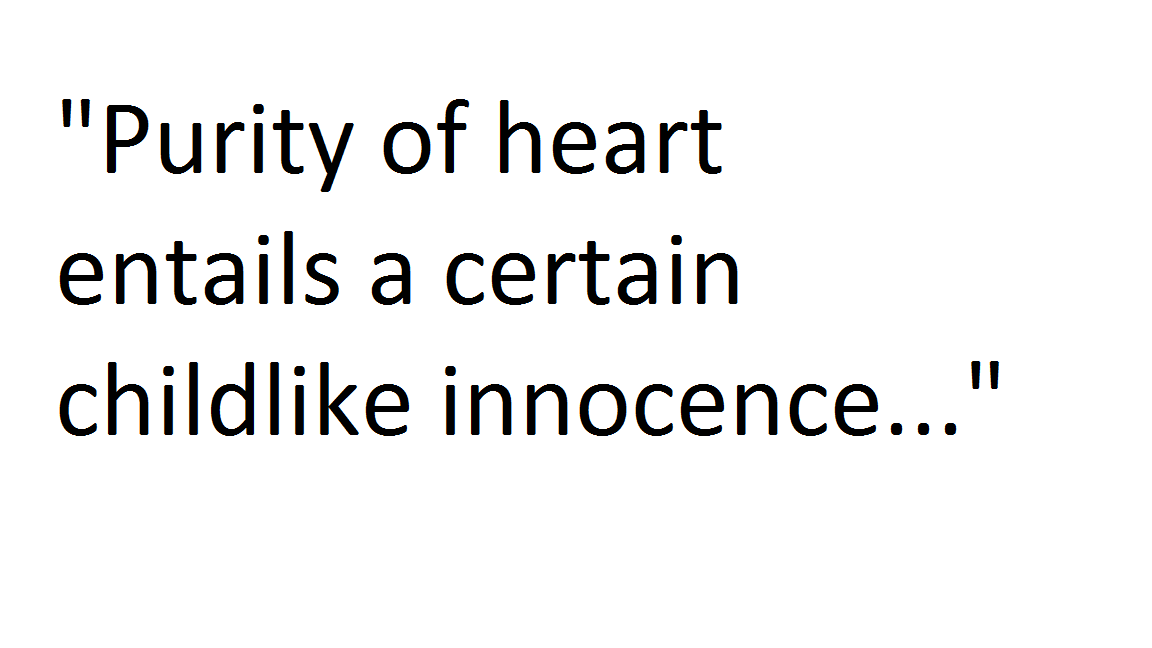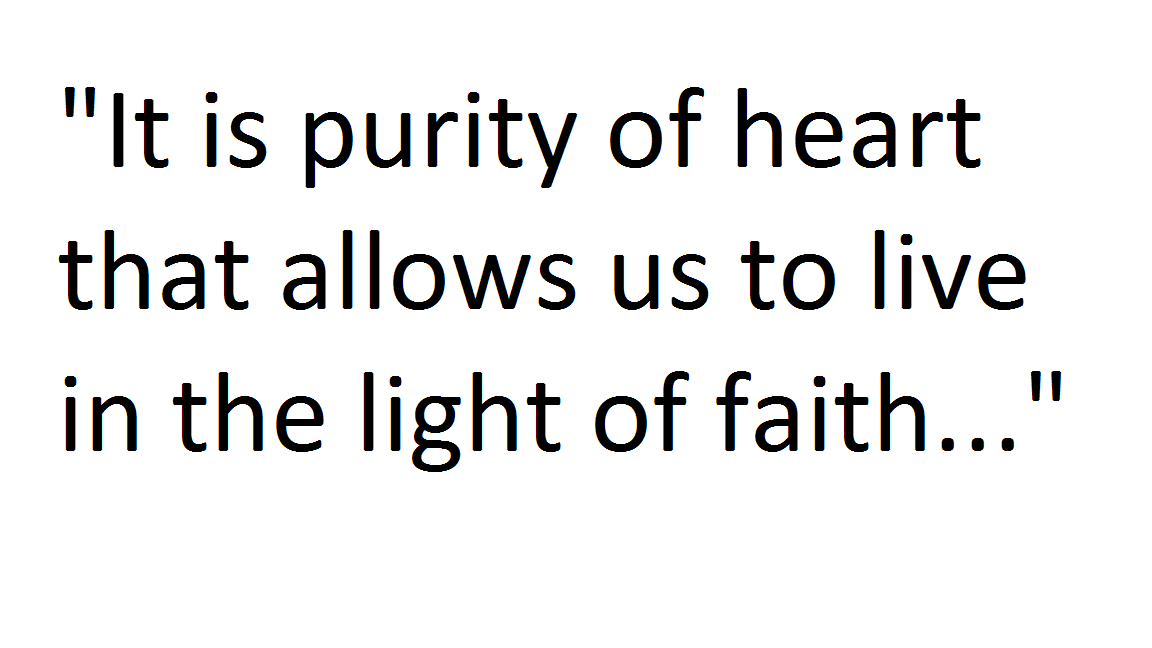Blessed are the pure in heart, for they shall see God. (Mt 5:8)
This seeing God is the reward of faith; to which end our hearts are made pure by faith. (St. Augustine)
St. Augustine connects this beatitude with the virtue of faith. This may at first seem odd until we think of the connection between faith and sight: Pope Francis began his first encyclical by writing that those “who believe, see; they see with a light that illumines their entire journey, for it comes from the risen Christ, the morning star which never sets” (Lumen Fidei 1); St. Paul writes that we walk by faith, not by sight (2 Cor 5:7); before raising Lazarus, Jesus tells Martha, “if you would believe you would see the glory of God” (Jn 11:40).
The link, then, between purity of heart and the sight of God, is faith. As Catholics, we believe that faith in God implies faith in the Church and in her teachings; this raises some important questions: How can we understand the phenomenon of Catholics who support the notion of marriage between two persons of the same sex, and how can we respond to those who say, “Well, I’m Catholic, and I think it’s fine”?
 It’s important not to make a judgment about the state of anyone else’s relationship with God. (This is actually what Pope Francis meant when he famously said, “If a person is gay and seeks the Lord and has good will, who am I to judge him?”—it’s not for us to determine whether someone does or doesn’t have a thriving relationship with God.) Purity of heart entails a certain childlike innocence; we should therefore, like children, assume the good intentions of our fellow man. We would do well to abide by the words of St. Paul in this regard: the aim of our charge is love that issues from a pure heart and a good conscience and sincere faith (1 Tim 1:5).
It’s important not to make a judgment about the state of anyone else’s relationship with God. (This is actually what Pope Francis meant when he famously said, “If a person is gay and seeks the Lord and has good will, who am I to judge him?”—it’s not for us to determine whether someone does or doesn’t have a thriving relationship with God.) Purity of heart entails a certain childlike innocence; we should therefore, like children, assume the good intentions of our fellow man. We would do well to abide by the words of St. Paul in this regard: the aim of our charge is love that issues from a pure heart and a good conscience and sincere faith (1 Tim 1:5).
But perhaps this seems somewhat unsatisfactory. And perhaps it should; for this is not the end of the story. We ought not convince ourselves or others that a Catholic who supports the notion of marriage between two persons of the same sex is a belligerent rebel who has no regard for beauty, truth, or goodness and who certainly does not know the Father in any meaningful way. But we also ought not sit idly by while our brother or sister in Christ continues in his/her ignorance of the fullness of the Gospel and of the Church’s beautiful and robust teaching about the nature and goodness of marriage; one of the seven spiritual works of mercy is to instruct the ignorant (and “ignorance” here doesn’t mean a willful act of ignoring something, it just means a lack of knowledge). This work of instruction, just as everything else in our lives, must be done in all charity.
How do we go about this instruction? First of all, with a pure heart and a good conscience and sincere faith. But what about more concrete ways? Arguments strictly from authority, e.g., “So-and-so says so, so it’s so”, are rarely effective, even if they’re true. We can also argue directly from divine revelation, but it may be that even some of our fellow Catholics may be resistant to such arguments. But with this particular issue (and many others) we can also argue simply from reason, in this case from human nature. But we should at the same time be attentive to the fact that arguments from reason alone regarding matters that have also been revealed aren’t always effective either. For example, St. Thomas Aquinas provides five logically solid demonstrations from reason alone for the existence of God, the famous “Five Ways”—yet there are many who follow the logic of the arguments to the conclusion that God exists and still don’t go to church.
 This is one way in which we can see that faith and reason work together: arguments from revelation alone can come across as unfounded dogmatic assertions, while arguments from reason alone can fail to effect a discernable change in the lives of those with whom we speak. When we begin to see that faith and reason each influence each other, it becomes clear that they are “like two wings on which the human spirit rises to the contemplation of truth; and God has placed in the human heart a desire to know the truth—in a word, to know himself—so that, by knowing and loving God, men and women may also come to the fullness of truth about themselves” (St. John Paul II, Fides et Ratio, introduction). It is purity of heart that allows us to live in the light of faith, unencumbered by the darkness of error and sin; let us pray that we and all of our brothers and sisters in the Lord may come to the full knowledge of the truth, which saves us and sets us free.
This is one way in which we can see that faith and reason work together: arguments from revelation alone can come across as unfounded dogmatic assertions, while arguments from reason alone can fail to effect a discernable change in the lives of those with whom we speak. When we begin to see that faith and reason each influence each other, it becomes clear that they are “like two wings on which the human spirit rises to the contemplation of truth; and God has placed in the human heart a desire to know the truth—in a word, to know himself—so that, by knowing and loving God, men and women may also come to the fullness of truth about themselves” (St. John Paul II, Fides et Ratio, introduction). It is purity of heart that allows us to live in the light of faith, unencumbered by the darkness of error and sin; let us pray that we and all of our brothers and sisters in the Lord may come to the full knowledge of the truth, which saves us and sets us free.
~
This series is a guest contribution by a Dominican student brother who has been fulfilling his pastoral ministry assignment by serving as an intern at the USCCB’s Secretariat for Laity, Marriage, Family Life, and Youth.

Leave a Reply